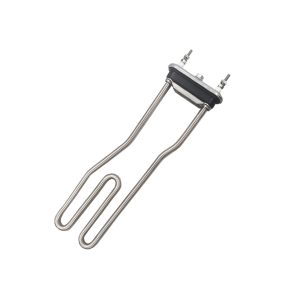-
 Features
Features- Energy efficient, self-regulating SRL uses less energy when less heat is required.
- Easy to install, SRL can be cut to any length (up to max. circuit length) in the field.
- Field splices can be performed easily in minutes with no scrap or wasted cold sections.
- SRL features lower installed cost than steam tracing, less maintance expense and less downtime
- SRL can be overlapped without burnout, which simplifies heat tracing of in-line process equipment such as valves, elbows and pumps.
- Because SRL is self-regulating over-temperature conditions are minimized
-
 Features and Advantages
Features and Advantages- Unique ceramic heater - selected ceramics with high thermal durability, mechanical strength and good electrical insulation. High quality
- Nichrome wire is used
- High emissivity
- Quick thermal response, high thermal efciency
- Easy control to radiate favourable wave lengths for different target materials
- 1-10 times more speedy than ordinary heaters
- Uniform temperature distribution
- Electric power may be saved up to 50% production yield may be raised 30% up
- Oven volume reducible to one half or even less. Maintenance or replacement of existing old-fashioned heat pipes in ovens is easy
- Free from dust contamination. No re ame appears during heating process
- High safety
-
 Terminal Air Heater
Terminal Air Heater- Located ahead of the blowing vents in an air-conditioning network. It is relatively low powered (a few kW)
- Circular duct heaters or "drawer type" duct heaters are the most widespread in use.
- "Drawer-type" heaters, which are designed to be installed directly in an opening made in the duct, are built around stored elements.
- They are bent upon request and can be delivered in small series in a week.
- Located upstream from the duct network at the air treatment station level
- It heats the treated air volume in its totality. Its power reaches a few tens of kW.
- Consisting of bare tubular elements or finned tubular elements, these duct heaters generate low transition losses. They are usually built around stored elements, assuring short delivery deadlines, and are installed in a frame made of galvanized steel sheet (stainless on request) sized to the dimensions of the blowing duct.
-
 Terminal Air Heater
Terminal Air Heater- Located ahead of the blowing vents in an air-conditioning network. It is relatively low powered (a few kW)
- Circular duct heaters or "drawer type" duct heaters are the most widespread in use.
- "Drawer-type" heaters, which are designed to be installed directly in an opening made in the duct, are built around stored elements.
- They are bent upon request and can be delivered in small series in a week.
- Located upstream from the duct network at the air treatment station level
- It heats the treated air volume in its totality. Its power reaches a few tens of kW.
- Consisting of bare tubular elements or finned tubular elements, these duct heaters generate low transition losses. They are usually built around stored elements, assuring short delivery deadlines, and are installed in a frame made of galvanized steel sheet (stainless on request) sized to dimensions of blowing duct
-
 Application
Application- Flanged immersion heaters are one of the most widely used methods for heating gases and liquids (such as water, oil, heat transfer fluid and corrosive solutions ).
- Designed for use in tanks and pressurized vessels, they are easy to install and maintain to provide heat for many processes.
- The direct immersion method is energy efficient and easily monitored and controlled. "Hot Water Storage Tanks" "Warming Equipment" "Preheating all Grades of Oil" "Food Processing Equipment" "Cleaning and Rinsing Tanks" "Heat Transfer Systems" "Process Air Equipment" "Boiler Equipment" "Freeze Protection of Any Fluid"
- The heated media, viscosity, specific heat, density and corrosive properties.
- Contaminants present in the medium.
- The heater sheath material corrosion resistant properties.
- Watt density of the heating element the heat output per square inch.
- Maximum sheath temperature this is the recommended maximum sheath temperature of the element material. It is not the operating temperature of the heated medium.
-
 Typical Applications » Water Heating "Washrooms, dishwashing and rinsing, process water heating, jacket kettles, hot water storage tanks, and hydronic heating systems" » Freeze Protection Water cooled engines, standpipe water tanks for fire protection, oil sump heaters" » Heat Transfer Oil Heating "Process kettles, molding dies and platens, mixing and blending mills, closed-loop heat transfer systems for asphalt and heat sensitive materials" » Fuel Oil Heating "Preheating to pumping viscosity, preheating for delivery to burners" » Steam, Air and Gas Heating "Steam super heating, air preheating for process equipment"
Typical Applications » Water Heating "Washrooms, dishwashing and rinsing, process water heating, jacket kettles, hot water storage tanks, and hydronic heating systems" » Freeze Protection Water cooled engines, standpipe water tanks for fire protection, oil sump heaters" » Heat Transfer Oil Heating "Process kettles, molding dies and platens, mixing and blending mills, closed-loop heat transfer systems for asphalt and heat sensitive materials" » Fuel Oil Heating "Preheating to pumping viscosity, preheating for delivery to burners" » Steam, Air and Gas Heating "Steam super heating, air preheating for process equipment" -
 Application
Application- Flanged immersion heaters are one of the most widely used methods for heating gases and liquids (such as water, oil, heat transfer fluid and corrosive solutions ).
- Designed for use in tanks and pressurized vessels, they are easy to install and maintain to provide heat for many processes.
- The direct immersion method is energy efficient and easily monitored and controlled. "Hot Water Storage Tanks" "Warming Equipment" "Preheating all Grades of Oil" "Food Processing Equipment" "Cleaning and Rinsing Tanks" "Heat Transfer Systems" "Process Air Equipment" "Boiler Equipment" "Freeze Protection of Any Fluid"
- The heated media, viscosity, specific heat, density and corrosive properties.
- Contaminants present in the medium.
- The heater sheath material corrosion resistant properties.
- Watt density of the heating element the heat output per square inch.
- Maximum sheath temperature this is the recommended maximum sheath temperature of the element material. It is not the operating temperature of the heated medium
-
 Application
Application- Screw Plug Immersion Heaters are used for heating liquids and gases in a variety of processes.
- These heaters are ideal for process water heating and freeze protection.
- These heaters are ideal for process water heating and freeze protection. All types of oils and heat transfer solutions can also be heated using these compact, easily controlled units.
- The direct immersion method is energy efficient and well suited for many applications. "Hot Water Storage Tanks" "Warming Equipment" "Preheating all Grades of Oil" "Food Processing Equipment" "Cleaning and Rinsing Tanks" "Heat Transfer Systems" "Process Air Equipment" "Boiler Equipment" "Freeze Protection of Any Fluid"
- The heated media, viscosity, specific heat, density and corrosive properties.
- Contaminants or pH present in the media.
- The corrosion resistant properties of heater sheath material.
- Watt density of the heating element the heat output per square inch.
- Screw plug material.
-
 Application
Application- Flanged immersion heaters are one of the most widely used methods for heating gases and liquids (such as water, oil, heat transfer fluid and corrosive solutions ).
- Designed for use in tanks and pressurized vessels, they are easy to install and maintain to provide heat for many processes.
- The direct immersion method is energy efficient and easily monitored and controlled. "Hot Water Storage Tanks" "Warming Equipment" "Preheating all Grades of Oil" "Food Processing Equipment" "Cleaning and Rinsing Tanks" "Heat Transfer Systems" "Process Air Equipment" "Boiler Equipment" "Freeze Protection of Any Fluid"
- The heated media, viscosity, specific heat, density and corrosive properties.
- Contaminants are present in the medium.
- The heater sheath material corrosion resistant properties.
- Watt density of the heating element the heat output per square inch.
- Maximum sheath temperature this is the recommended maximum sheath temperature of the element material. It is not the operating temperature of the heated medium
-
 Features
Features- Highly adaptable to most applications where electrical heating is required. They can be used in their straight form or bent into various shapes.
- Used in free air, clamped to a surface, placed inside a groove, or cast into metal.
- Use 80% Nickel 20 % Chromium high-grade coiled resistance wire as a heating core.
-
 Features
Features- Highly adaptable to most applications where electrical heating is required. They can be used in their straight form or bent into various shapes.
- Used in free air, clamped to a surface, placed inside a groove, or cast into metal.
- Use 80% Nickel 20 % Chromium high-grade coiled resistance wire as a heating core.







